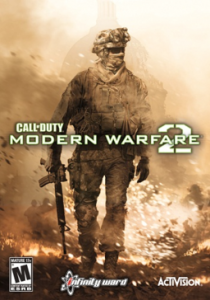395th played so far Genre: First-Person Shooter
Genre: First-Person Shooter
Platform: Various
Year of Release: 2009
Developer: Infinity Ward
Publisher: Activision
“No Russians”
As might have become clear from our earlier writing, Call of Duty is a decently done series, with the first Modern Warfare title holding up better than the first game we played. There’s just not much that stood out for us (and now, three years later, that effect has gotten greater through ignorance). For that reason, this write-up may be a bit less about gameplay, and a bit more about controversy.
Our Thoughts
Because to be honest, it mattered to us. Those who haven’t heard of it yet – an early level has you undercover in a Russian terrorist cell. As part of that group, you attack an airport – walking through the building while civilians are being shot. Depending on your international version, you can also shoot these civilians (in a few, that is a game over). These react realistically – begging for their lives, crawling away and hiding. You have no way of stopping it – the terrorists are immune to harm at this point.
We played for less than a minute, then decided to skip this level. It felt too real and too in-your-face to be comfortable. I don’t want to say that should immediately mean this shouldn’t be featured for that reason (and it should not be up to me), but for me, as a player, it’s simply not a level or game I want to play.
This did lead us to a discussion why we felt this way. When you think about it, we do worse in other games. In a Saints Row or Grand Theft Auto game, we probably risk killing more people. An RTS like Command & Conquer has you send far more characters to their death. In Assassin’s Creed you can get even more specific in your kills. Yet it bothered me more here. It felt like it came down to realism. First of all, Call of Duty is set in – and prides itself on being set in – a realistic, (near-)contemporary version of our world. The reactions, too, are realistic, not just cartoonishly running away or just being dead, but people being crippled, others acting traumatized, and it all doing its best to affect you more closely.
In that sense, our disgust is (hopefully) the wanted result – you’re not meant to be okay with it – but you don’t really get an early enough resolution. In fact, the infamous Breivik shootings in Norway were stated to be in part staged using this game, which I suppose both shows its realism and how a game like it can influence those already susceptible. It’s a pretty uncomfortable idea.
The game itself plays much like the previous games. There are a few interesting scenarios – the game relies a lot more on stealth than before – but feels like it lacks a couple of clear goal signposts on places. Some outcomes required guesswork as the game never really made it clear what we should be doing.
It might be that the one level has changed things, but overall the game just didn’t feel as strong as the previous entries in the series we played. Exhaustion might have played a role as well – since then we’ve played better – but on the whole it didn’t entirely feel like it was worth bothering with the game. At least there’s something to talk about though, right? The thing is, these games are some of the biggest sellers around even when they choose not to change much from year-to-year.
Final Thoughts
Ignoring the moral outcry, while there were some unique fun bits in the game, they were also quickly linked to the more annoying ones – a stealth mission is fun, but left you with little indication on what to do. The whole time I was playing it, it felt like the game was pandering to a Call of Duty audience – and that’s just not me. It seems like there’s better shooters out there (hey, have you heard of this little game called Halo) and even a Splinter Cell game gave us more interesting scenarios to play through.
[…] There are a lot of army-based shooters out there – Call of Duty has, depending on your perspective, either a lot to answer for or set a good example. As we might have intimated, we’re not a fan. […]